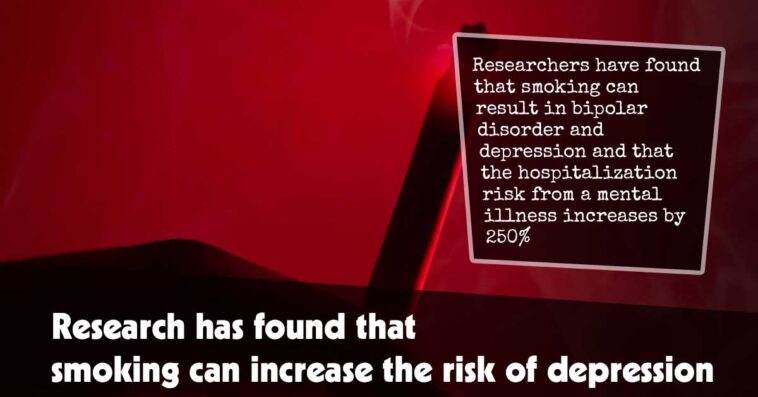Study Reveals Smoking Raises the Risk of Depression
Researchers have discovered that smoking increases both bipolar disorder and depression risk by 250%, as well as the hospitalization risk from these mental conditions.
Researchers utilized data from the UK Biobank, an extensive health information database containing genetic information for over 500,000 individuals. The genetic information was then combined with additional health details provided by participants of this research study.
Individuals typically begin smoking between the ages of 20-30 but don’t typically receive a diagnosis until 30-60 years later.
Individuals typically began smoking by age 17 while typically not seeking hospital treatment for mental illnesses until post-30.
Up to 90% of those who were former or current smokers began before 20 years old; therefore, chances are slim for an individual starting smoking after this age. Genes also play a large part in whether an individual will become a smoker.
Looking at the database of smokers, several recurrent genetic variants were observed. By studying studies where identical twins from separate households shared identical genes but nonetheless became smokers themselves, it could be seen that genetic risk can account for 43% of smokership risk.
Smoking was more likely to start smoking among adopting parents who themselves were smokers, than nonsmoking adopting parents; although risk was still elevated if one or both’real’ parents smoked and passed on specific genes that caused smoking habits.
Smoking-related genes encompasses various genetic variants. People carrying smoking-related genes but who did not smoke were found to have lower risks for mental disorders than individuals carrying smoking-related genes who did smoke.
Before, this issue had been unclear, with genetic variants appearing to correlate to an increased risk of mental illnesses; but this study demonstrated that smoking increases the likelihood of mental disorders because of “smoking-related genes.”
Smoking appears to lead to mental disorders like schizophrenia, bipolar disorder and depression; researchers do not yet fully understand why but offer various theories as explanations.
Smoking and mental disorder associations remain to be fully explored biologically, though one theory suggests that nicotine inhibits serotonin absorption into the brain’s neurotransmitters; depression patients typically produce insufficient serotonin.
Nicotine stimulates serotonin production when an individual smokes a single cigarette, producing a relaxing feeling after smoking. But continuing smoking will have the opposite effect; nicotine will inhibit serotonin production instead, leaving one feeling unstable, upset and anxious.
Smoking may contribute to inflammation in the brain, compromising areas of it and leading to various forms of mental disorders.
